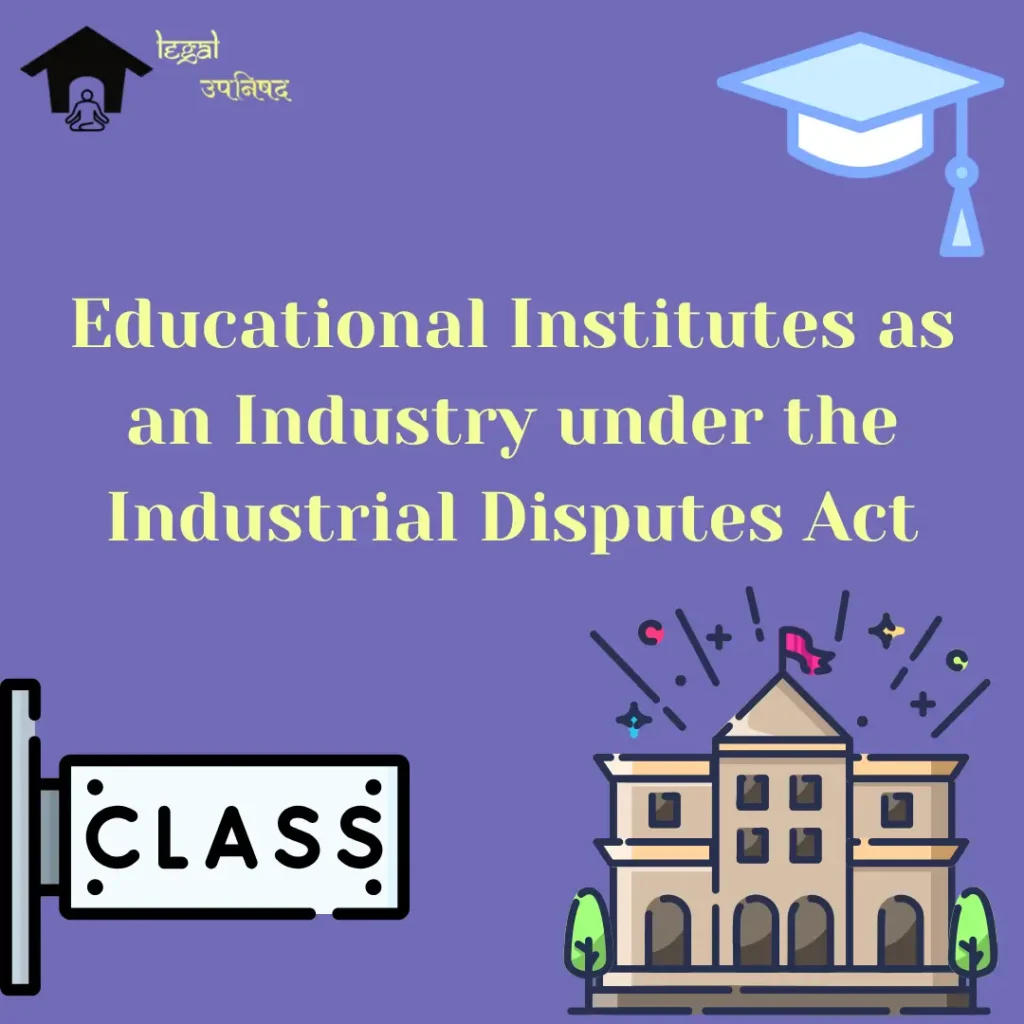This article on ‘Educational Institution as an Industry Under The Industrial Disputes Act, 1947‘ was written by Riya Chaudhary, an intern at Legal Upanishad.
Introduction
Investigating and resolving workplace disputes is the primary goal of the Industrial Dispute Act, of 1947. Swift resolution of labour disputes, good relations between the workforce and management, and continuing industry production are the key objectives of the act. The Industrial Dispute Act says that the act applies to all areas that fall under the definition of “Industry.”
Every day, new schools and colleges open their doors. Many fake academic institutions or claims of false affiliation with well-known universities exist in India and abroad. In April 2018, the UGC published a list of 24 bogus universities by state. The majority of these colleges and schools are run by fly-by-night companies with only commercial intentions. In the past couple of years, education has devolved into a business instead of a societal service. There have been instances in which the Academic Institution has been penalised under the Consumer Protection Act of 1986, depending on the cause of action.
A significant number of decisions conveyed by State and National level Consumer Forums are now accessible, which safeguard students’ rights with respect to fees, incorrect roll number allocation, delay in declaring results, admission in surplus of the assigned quota, misrepresentation about the association by the academic institution to multiple colleges, and so on. The decisions in the aforementioned cases clearly show that a student is a consumer under the Act, and academic institutions or university colleges fall under the category of service providers.
In this article, we will be analysing the concept of industry under the Industrial Dispute Act, of 1947 with special reference to education institutions and universities.
Industry
Industrial Dispute Act,1947, Section 2(j) defines “industry” as “any business, trade, undertaking, manufacturing, or calling of employers, as well as any calling, service, employment, handicraft, industrial occupation, or hobby of workmen.” The government modified the industry’s definition in 1982 (Act No. 46 of 1982), but the new definition hasn’t been put into effect yet because the amendment didn’t specify a date from which it would take effect (the date is still not notified today)
In simpler words, the industry is organised, methodical cooperation between the employer and employee for the aim of production.


Educational Institution as an Industry
In the matter of Bangalore Water Supply, AIR 1978 SC 548, a seven-judge bench of this Court addressed the question of whether educational institutions are an “industry.” In accordance with Section 2(j) of the Industrial Dispute Act, of 1947, it was decided that educational institutions are an industry. The court set the following guidelines: –
- An enterprise is prima facie a “industry” if it meets the following three criteria:
- Systematic activity.
- Organized by cooperation between employer and employees.
- For the production and distribution of goods and services calculated to satisfy human wishes.
- It doesn’t matter if there is a profit motive or a gainful purpose; in other words, it doesn’t matter if there is capital or not.
- What makes the difference is the nature of the activity, with a focus on the relationship between the employer and the workers. The real point is how it works.
- If the organisation is a business or commerce, its status as such is not altered because charity drives it.
- Incorporated within the industry will be every department.
- The concept of the industry does not apply to the government’s sovereign functions (strictly speaking, this qualifies as an exemption alone).
The following industries are evaluated using the triple test formulae:
Educational Institutions and hospitals (as they have a set way of doing things, are run by cooperation between employees and employers, and make services that are meant to meet people’s needs and wants).
Conclusion
In light of the preceding discussions, it is fairly well backed on legal and rational premises that education falls within the scope of services. Students are consumers or beneficiaries of University/educational institutes’ services or facilities. Because of the nature of those specific services, all activities performed by universities/educational institutes may not be categorised as marketable services, but this does not endorse the full rejection of universities/educational institutes from the scope of Consumer Protection Laws. The exclusion of universities and educational institutes from the scope of the Act will transform education into a business sector.
The tests in the Bangalore Water supply case and the rulings in the other cases both confirm this, that only those establishments that are organised, systematic, and work for the production and services by a systematic relationship between an employer and an employee to meet human needs and are of commercial nature and non-sovereign, i.e. do it for trade and business, falls within the definition of “industry” given under the act.
List of References:
- Adv Amaresh Singh, SUPREME COURT OF INDIA – EDUCATIONAL INSTITUTION IS AN INDUSTRY IN TERMS OF THE INDUSTRIAL DISPUTES ACT –THOUGH NOT ALL OF ITS EMPLOYEES ARE WORKMEN BUT THE DRIVER EMPLOYED BY A SCHOOL BEING A SKILLED PERSON IS A WORKMAN, Advocates Club, available at: https://advocatesclub.in/service-labour-law/supreme-court-india-educational-institution-industry-terms-industrial-disputes-act-though-not-employees-workmen-driver-employed-school-s/
- Whether ‘Educational Institutions’ would come within the meaning of ‘Industry’, Lawyers Club India, 17 June 2020, available at: https://www.lawyersclubindia.com/judiciary/whether-educational-institutions-would-come-within-the-meaning-of-industry–4403.asp
- Is educational Institution an Industry?, Notes for free, available at: notesforfree.com/2018/03/16/educational-institution-industry-labour-law-law-school-notes/
